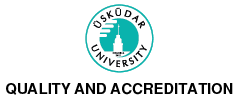
YÖKAK Evaluation Programs
The Higher Education Quality Council (YÖKAK) conducts assessment programs to improve the quality of higher education institutions in Turkey and to ensure continuous improvement. These programs cover education and training, research and development, management, social contribution and other important processes and assess the compliance of institutions with quality standards.
Some of the evaluation programs carried out by the Higher Education Quality Council are listed below.

Institutional External Evaluation Program (IEP)
The Institutional External Evaluation Program conducted by the Higher Education Quality Council aims to evaluate the education-training, research-development and management processes of higher education institutions. This program envisages the examination of institutions within the framework of Institutional External Evaluation Criteria and higher education institutions are obliged to participate in this program at least once every five years.
Annual Institutional Internal Evaluation Reports (IERs) form the basis of the Institutional External Evaluation Program and are prepared to support the implementation of the program. Higher education institutions that are approved to participate are selected and assigned by the evaluation team that will carry out the evaluation process. This process consists of two stages: a pre-visit and a site visit. Following the visits, the Institutional Feedback Report (IFRR) is publicly disclosed by the Higher Education Quality Council.
Higher education institutions subjected to the institutional external evaluation program are included in the monitoring program at the beginning of the second year after the evaluation year.
Monitoring Program (IP)
Higher education institutions are evaluated with customized Institutional Feedback Reports as a result of field visits carried out by the Higher Education Quality Board (YÖKAK). Following this evaluation process, it is aimed for institutions to direct their activities more effectively.
Higher education institutions whose evaluation is completed within the scope of the Institutional External Evaluation Program are included in the Monitoring Program in the second year following the evaluation year. The Monitoring Program aims to evaluate the development processes of institutions based on the results of external evaluation. In this framework, it focuses on the "areas open for improvement" specified in the Institutional Feedback Reports and also considers the sustainability of the strengths of the institution.
Institutions that have not been evaluated within the scope of the Monitoring Program are not included in the scope of the Institutional Accreditation Program (KAP). The monitoring process is carried out through special "monitoring teams" formed by YÖKAK. The teams consist of at least two members, one of whom may be an experienced member who has served as the previous team chair, and one or more members selected from the evaluator pool.
Institutional Accreditation Program (KAP)
The Institutional Accreditation Program (IAP) is an external evaluation method that evaluates the quality assurance, education-training, research and development, social contribution and management processes of higher education institutions within the framework of the "planning, implementation, control and prevention" cycle. The evaluation teams formed by the Higher Education Quality Council act in line with the Criteria for Institutional External Evaluation and Accreditation and the Guidelines for Institutional External Evaluation and Accreditation.
Higher education institutions are selected annually by the Council of Higher Education (YÖKAK) and evaluation teams are formed in the appropriate structure for these institutions. The relevant evaluation teams complete the evaluation process by conducting a two-stage visit (pre-visit and site visit).
Following the visits, the evaluation teams prepare Institutional Accreditation Reports (IARs), which are evaluated by YÖKAK to reach an accreditation decision.
YÖKAK may make the following decisions within the scope of the Institutional Accreditation Program:
- Full Accreditation (For Five Years): All processes of the institution have been successfully evaluated and determined to be in compliance with the standards.
- Conditional Accreditation (Two Years): The institution is accredited for a period of time to fulfill certain conditions. It is expected to meet the specified conditions within this period.
- Decision to Deny Accreditation: A decision has been taken that the institution does not meet certain standards as a result of the assessment and accreditation is denied. In this case, the institution has to wait for a period of time to be re-evaluated by taking certain corrective measures.
Interim Assessment Program (IAP)
Higher education institutions that are evaluated within the scope of the Institutional Accreditation Program (KAP) and receive full or conditional accreditation decisions are included in the interim evaluation process in the second year following this decision. The main objective of the interim evaluation is to assess the development of quality processes in institutions that have been granted full or conditional accreditation. This process can result in a variety of decisions, including continuation of full accreditation, conversion of conditional accreditation to full accreditation, continuation of conditional accreditation, removal of conditional accreditation or continuation of conditional accreditation.
The focus of the interim evaluation includes an assessment that improvements have been made in relation to the "areas for improvement" identified in the Institutional Accreditation Report (IAR) and the Accreditation Decision Letter. It also assesses whether strengths have been sustained. The interim evaluation process is conducted in a specific way depending on the type of accreditation decision made as a result of the PDP.
The Institutional Monitoring Evaluation Reports (IERRs) of institutions that have received full accreditation for five years are reviewed by the Institutional External Evaluation and Accreditation Commission. It is determined whether a site visit is needed and the Board decides whether to conduct a site visit within the scope of the interim evaluation.
In the second year of the interim evaluation, for institutions that have received full accreditation for five years and conditional accreditation for two years, the interim evaluation is carried out through special interim evaluation teams formed by YÖKAK. These teams consist of at least four members, one of whom is a member who has previously chaired the team, and the others are members selected from the pool of evaluators. The members of the interim evaluation team have no conflict of interest with the higher education institution they will be involved in the process.